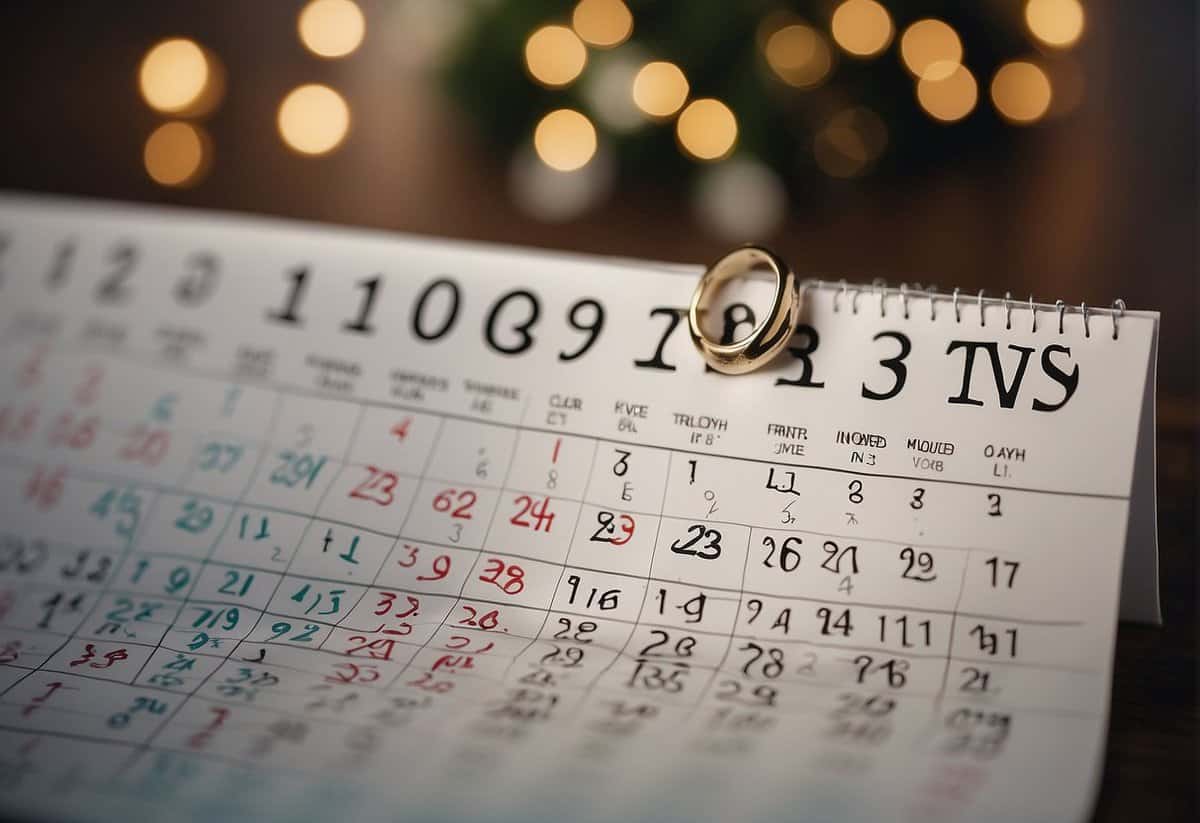How Long After a Proposal Do People Get Married? Understanding the Engagement Period
After a heartfelt proposal, you and your partner are likely floating on cloud nine, envisioning your perfect wedding day. But before you mark your calendars, you might wonder how long couples typically wait between getting engaged and walking down the aisle. While there is no one-size-fits-all answer, the engagement period is a time for you to joyfully announce your commitment to the world and start planning for the future.

During this time, you’ll not only plan the ceremony and celebrations but also have a chance to deepen your connection with your partner. Many couples use this period to discuss important aspects of their future life together, like finances, children, and living situations. The average engagement lasts according to a study mentioned by The Knot, although some prefer a shorter timeframe to maintain the momentum and excitement leading up to marriage.
Key Takeaways
- Your engagement period is unique and may last from a few months to a few years.
- This time allows for vital relationship-building and wedding planning.
- Finding a balance between excitement and careful preparation can enhance the pre-marriage experience.
Understanding the Engagement Period

After the excitement of a proposal, you’re now entering a significant phase of your relationship—a time to plan and prepare for your upcoming marriage. This period is not only about event planning but also about continuing to build your relationship’s foundation.
Meaning of Engagement
Engagement is a formal agreement to get married. It’s the time when you announce to your family and friends that you and your partner have made a significant relationship milestone. You’re no longer just dating; you’ve made a public commitment to marry, often symbolized by the exchange of rings.
Average Duration Between Engagement and Marriage
The time from engagement to wedding varies among couples. On average, many couples in the United States spend about 2.5 years dating before getting engaged. Once engaged, the average duration between the engagement and marriage is usually between 12 and 18 months. It gives you time to plan the wedding details, consider financial preparation and celebrate with engagement parties and perhaps wedding showers. Engagements are personal, and some may prefer a shorter period due to family considerations or simply eagerness to start their married life sooner.
Planning for the Big Day

After the excitement of the proposal, it’s time to focus on the practicalities of planning your wedding. This section details essential considerations, from setting a date to managing your budget, to help you prepare for your big day.
Setting a Wedding Date
Choosing your wedding date is a significant first step in the planning process. The average couple is engaged for about 13 months, which provides ample time to organize and plan. Consider seasonality, work schedules, and any major holidays that might affect guest availability. Once you have a date in mind, it’s a good idea to start planning after a short period of engagement celebration.
Wedding Planning Considerations
Your wedding planning journey includes many milestones. Begin by envisioning the kind of wedding you both desire, which will then help determine many of your subsequent choices – from venue to vendors. Staying organized is crucial: use a wedding planning checklist or a wedding website to keep track of tasks and deadlines. Don’t forget pre-wedding events like the engagement party, which can also take some organizing.
- Key Tasks:
- Venue selection
- Vendor hiring
- Dress fittings
- Guest list creation
Budgeting for the Wedding
A well-planned budget is the backbone of a successful wedding. Start by determining how much you’re comfortable spending and stick to it as close as possible. Account for all aspects of the wedding, including the engagement party, wedding attire, and even post-wedding expenses. Remember, flexibility within your budget can help alleviate potential stress, so it’s wise to allocate funds for unexpected costs. Keep your finances in check by periodically reviewing your expenses against your budget.
- Budget Breakdown (Example):
- Venue: 40%
- Catering: 30%
- Photography: 10%
- Attire, Music, Flowers, Misc: 20%
The Social Aspects of Engagements and Weddings

Engagements and weddings have rich social significance and often involve unique traditions that reflect personal and cultural meaning. These events not only celebrate your commitment but also solidify social bonds.
Engagement Announcements and Parties
After receiving the engagement ring, it’s customary for you to share the news with the closest people in your life. Traditionally, this might start with a party exclusively for family and friends to toast your future. The timing and formality of engagement parties can vary widely, but they often serve as the kickoff for pre-wedding festivities.
- Who to notify first? A common consideration is to personally inform your nearest family before making the broader announcement.
- Party planning: A celebration that’s either formal or casual, depending on your style, helps to gather your loved ones to celebrate the occasion.
Roles of Family and Friends
Family and friends play pivotal roles throughout your engagement and as you approach your wedding day. Not only are they your support system, but they also often take on specific roles within the wedding process. These could be as members of the bridal party, giving speeches, or helping to plan and organize the big day.
- Family: From the emotional support to possibly contributing to wedding planning, their involvement is invaluable.
- Friends: From best man to bridesmaids, these are the people you count on to help you celebrate and prepare for marriage.
Social Media and Modern Engagements
In today’s digital age, social media platforms like Instagram have become a hub for engagement announcements. You’ll want to think about how to craft that perfect post to showcase your engagement ring and share your joy.
- Visual appeal: High-quality photos or a short video can make your announcement stand out.
- Hashtags and tagging: Use relevant tags to share your moment with a wider audience or keep it intimate with selected friends and family.
Relationship Dynamics and Marriage Readiness

Before you consider the journey from a marriage proposal to the wedding day, it’s crucial to examine the integrity of your relationship’s foundation. Communication and conflict resolution, aligning values and future plans, and recognizing signs of a healthy relationship are the cornerstones to determine readiness for marriage.
Communication and Conflict Resolution
Effective communication is the lifeblood of your relationship, influencing how well you and your partner can express feelings, desires, and concerns. It’s essential for resolving conflicts in a way that strengthens your bond. If you find yourselves consistently reaching satisfactory resolutions to disagreements, it’s a positive sign you can handle the challenges marriage may bring.
Aligning Values and Future Plans
A harmonious future often hinges on shared values and mutually respectful future plans. It’s crucial to ensure you’re not only compatible in the present but also aligned for long-term commitment. Take time to discuss life goals, career aspirations, family plans, and personal growth to gauge whether your paths are truly congruent.
Signs of a Healthy Relationship
Assess your relationship for signs of health, like mutual respect, trust, and joy in each other’s company. Behavior that demonstrates these traits indicates a sustainable relationship. A premature proposal—deciding to get married during the honeymoon phase without sufficient experience or understanding—can lead to dissatisfaction. Be aware of any rush to the altar and consider if it’s too soon or if you’ve both genuinely arrived at a place of readiness.
Frequently Asked Questions

After you’ve said “Yes!” there’s a journey ahead before saying “I do.” These FAQs will guide you through the initial stages of post-proposal bliss to stepping down the aisle.
What are the first steps to take after getting engaged?
Once engaged, the first steps include sharing the news with your family and friends, considering how soon is too soon to propose, and discussing future plans and vision for your marriage and wedding with your partner.
How long is the typical engagement period before marriage?
The typical engagement period before getting married ranges from a year to eighteen months. This allows sufficient time to plan your wedding and prepare for married life.
Is there such a thing as being engaged for too long?
While there’s no set limit, an engagement that lasts several years may cause family and friends to frequently inquire about wedding plans. It’s your personal choice, but an extended engagement might make it more challenging to keep the momentum for wedding planning.
When is it considered too soon to hold an engagement party after a proposal?
You might want to consider holding an engagement party a few months after the proposal. This gives you time to bask in your new status and plan a celebration with your loved ones.
What is the average timeline for planning a wedding following a proposal?
An average timeline to plan a wedding is about 12-18 months post-proposal. It’s important because it gives you enough time to book your preferred venue, suppliers, and organize all the details for your special day.
How soon can be too soon to propose marriage?
Proposing less than a year after meeting someone can be risky, but some couples do it and have successful marriages. Understanding your mutual life goals, values and knowing each other well are key before deciding to get engaged.


